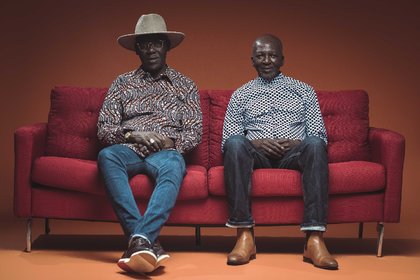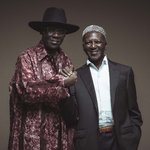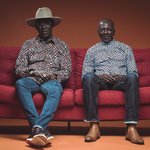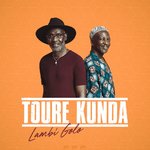- country:France
- region:Île de France
- style(s):World
- label:Soulbeat Records
- type:Band
- gender:male, female
- instrumentation:percussion, brass
- artist posted by:M'A Prod
Line up
- Abdallah Kane (Guitare)
- Ismaïla TOURE (singer / head)
- Mansour semega (bass)
- Mike Lapierre (keyboard)
- Sixu Tidiane TOURE (singer / head)
- Sixy Daby Toure (back vocalist)
Links
Bio by Franck Tenaille
The big comeback of Toure Kunda, the elephants of African music.
Toure Kunda are back. Not that they ever really left, but after an international career lasting forty years, they needed to renew their energy. And what better place to do this than in the heart of Casamance, where the incredible saga of the elephant family (Touré Kunda in soninké) took root? Younger generations are not aware that it’s from this region in southern Senegal, between savannah and mangroves, that one day one of the brothers left for France, just like his pedlar-shoemaker ancestor who left Mali for Casamance in search of crocodile skins, necessary for his work.
For Ismaël, who came to Paris in 1975 to try his luck and who took part in West African Cosmos, a combo experimenting with the hybridization of rock and afro sounds, it was to be the classic immigrant pathway of odd jobs, cold and solitude, association networks, themes which would recur later in several songs. Then in 1977 he was joined by Sixu, at that time working for an NGO teaching farmers new agricultural methods. The duo was known in hostels as the “Frères Griots” (Griots Brothers), before becoming a stage performing group with experienced musicians.
For there was a new public eager to discover this African continent, full of promising sounds. The partners in this adventure, in tune with a new global conscience, were the alternative press (Liberation, Actuel...), a pioneer label (Celulloid), altermondialist sites like Le Dunois or La Chapelle des Lombards, or extraordinary initiatives such as the Africa Fête festival launched by the invaluable Mamadou Konté. And so when Amadou, the elder brother, joined the duo, Toure Kunda became the ambassadors of a wave of African music which was to reveal Salif Keita, Mory Kante not forgetting Youssou N’Dour and of course older musicians such as Manu Dibango, Francis Bebey or Pierre Akendengue.
From then on Toure Kunda became pioneers. Forerunners of the World Music phenomenon, they will be the first group to perform in the immense Pantin Hippodrome. The first to organise a mega tour in Africa (cf the Paris-Ziguinchor album). The first to spice up their music using new technologies (cf the Natalia album, with the mythical producer Bill Laswell). The first Africans to have an impact in Japan. They will also be seen getting African Heads of State to let their hair down during the Francophonie Summit in Vittel in 1983, performing in the Carnegie Hall with Santana or meeting Mandela... Each event proving that the sceptics who, at the beginning of their career could not imagine that they would reach audiences beyond their own community, were wrong. These sons of Ziguinchor, fed on James Brown, Led Zepplin, Brassens or Credence Clearwater, always wanted to travel so as to meet other brothers, with the earth of their country clinging to the soles of their shoes and sabars close at hand. Hence the need, after forty years of performing, to return to this matrix which had nourished their imagination and provided their initial dreamlike fuel. Casamance, which like many other regions of the world had seen its immemorial teranga (hospitality) brutalised by the negative effects of globalisation (for instance the forests or the fishing waters looted by multinational organisations). And so the songs on this new album, which has been polished over a long period and recorded in “village studio” conditions to preserve the essence of life, evoke the loss of values for confused generations. These collective values that Toure Kunda have always defended and which are symbolised by the djambaadong , “dance of the leaves”, whose pulsating rhythms mark the passage from childhood to adulthood.
Values they evoke through the work of farmers, fishermen, blacksmiths or by the memories of the ex-leper who attended the dispensaries seeking food and who spread messages of love, peace and fraternity. On the other hand, the brothers denounce the exploitation of làmb, (famous Senegalese combat sport, once a school of humility and exemplarity), which has become a “monkey battle” (Lambi Golo, title of the album), a combat not unlike that of the politicians.
As we can see, no sign of nostalgia in this repertoire, as Toure Kunda have always been aware of the mutations and issues of the present. With this album, surrounded by brilliant likeminded musicians, (Paco Sery, Romain Ghezal, Alune Wade....) and famous friends (Manu Dibango, Nelson Palacio, Chelk Tidiane, Seck, Lokua Kanza...) Toure Kunda conjugate the word humanity in their own way. They who grew up in the Santhiaba district, between Soninkés, Diolas, Mandingues, Portuguese creoles, Peulhs or wolofs), the notion of “universal is local without the walls”, consider that any part of the world can only be a metaphor of the human diaspora. So let’s enjoy their musical thiéboudienne, energetic and tender, a mix of m’balax, casamancais rhythms, funk, pop rock, reggaizing spices, like an invitation to dance, to dream and to hope.
Frank Tenaille.





